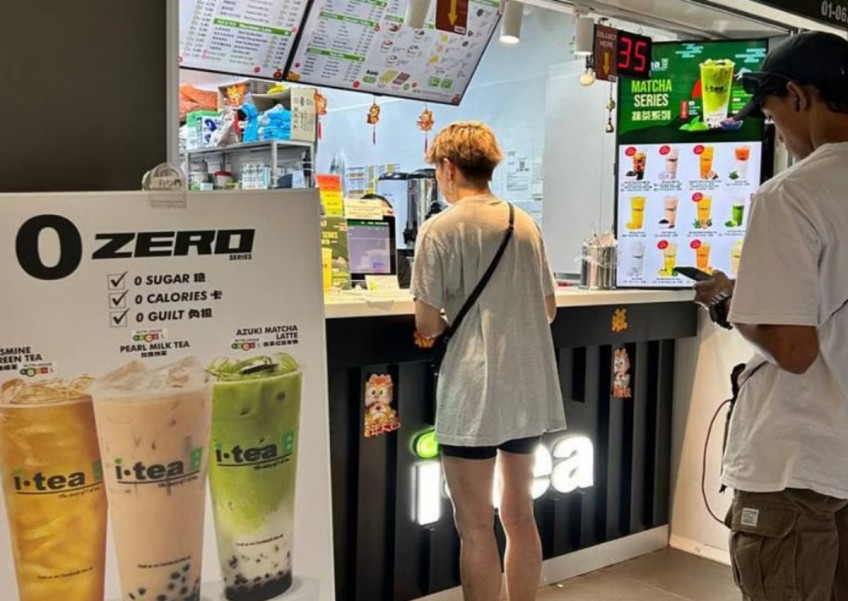iTea takes down ad that suggests its drinks have zero calories


SINGAPORE - Bubble tea chain iTea will be taking down an advertisement that appeared to promote drinks like pearl milk tea as zero-sugar and zero-calorie.
The brand, which has 47 outlets islandwide, apologised for its mistake and said there was no intent to mislead consumers.
A brand spokesman said its claim was referring to its new sugar substitute, and not meant to create the impression that its drinks were zero-calorie.
But the advertisements, which had been up at 12 of the brand's outlets since January 2024, had baffled consumers with its confusing and seemingly contradictory claims.
The promotion poster depicts three drinks — jasmine green tea, pearl milk tea and matcha latte with azuki beans — with text on the advertisement saying that there's zero sugar, zero calories and zero guilt, which is applicable for all drinks.
Max Seah, 35, who works in artificial intelligence, spotted the poster at the outlet in 205 Bedok North Street 1 on Jan 26 while he was waiting for his child's vaccination to be done at the nearby polyclinic.
"I thought it was bad marketing because it's blatantly untrue that pearl milk tea and matcha latte can have zero calories," said Seah.
He added: "If I buy a drink, I'll not base it on any of their claims. If I get a milk tea, I'll treat it like any milk tea I can get at any other shop. I'll just pretend their poster doesn't exist."
Consumers were also perplexed by the Nutri-Grade ratings of the drinks on the poster.
Its pearl milk tea is rated C with 0 per cent sugar, and its matcha latte with azuki beans is rated C with four per cent sugar.
Sally Lee, 50, who works in the gas energy sector, did a double take when she had a closer look at the poster while she was waiting for her drink at iTea's Admiralty Place outlet.
"If the pearl milk tea has 0 per cent sugar, why is it rated C?" said Lee.
Drinks in the C range have between 5g and 10g of sugar per 100ml, or 1.2g to 2.8g of saturated fat per 100ml.
A drink's Nutri-Grade rating is based on the highest sugar content offered by the brand. If the drink comes with toppings like pearls or jellies by default, the sugar content in the toppings are counted towards the drink's Nutri-Grade rating.
Dr Seah also pointed out contradictions within the poster itself. "The funny thing is that on the Nutri-Grade label for azuki matcha latte, it says there is four per cent sugar. But it's also saying zero sugar on the header text."
Siti Khadijah, 35, who works in the social services sector, said the poster raises many questions.
"There's an incongruence between the header 'zero calories' and the images. The science and nutritional info doesn't add up. Also, if I want to have zero calorie tea, I will just make myself one at home with a teabag and hot water, and add some ice if I want it cold," Siti added.
In response to queries from The Straits Times, iTea's senior area manager, Lau Jia Li, said its advertisement was to promote its "zero-calorie zero-fat sugar substitute".
"The zero calorie that we are referring to is the sugar substitute we are using, and not the drink itself," said Lau.
She added: "We wish to encourage customers to try our new zero-calorie sugar substitute which can be added in all drinks. Hence, we showcased three of our favourite drinks in the advertisement.
"There is certainly no intent to mislead customers."
She also explained how iTea derived its Nutri-Grade ratings for its drinks.
Lau said its bubble tea pearls are soaked with its sugar substitute and therefore have 0 per cent sugar.
Under current Nutri-Grade guidelines, milk sugars lactose and galactose, which is declared on the nutrition information panel, is subtracted from the amount of total sugar for the purpose of grading.
"Our pearl milk tea is graded C even when it has 0 per cent sugar because of the saturated fat content in the milk, which has 2.7g per 100ml," said Lau.
"The azuki matcha latte is also graded C because of the milk content and the four per cent sugar is derived from the red bean topping."
She said iTea introduced the sugar substitute to help consumers reduce sugar addiction without compromising the taste of the brand's drinks.
"We will aim to be clearer in our future advertisements to avoid confusion among our customers," said Lau.
ST has approached the Health Promotion Board, Singapore Food Agency and Advertising Standards Authority of Singapore for comment.
ALSO READ: Sterra under probe for another misleading ad on tap water quality
This article was first published in The Straits Times. Permission required for reproduction.